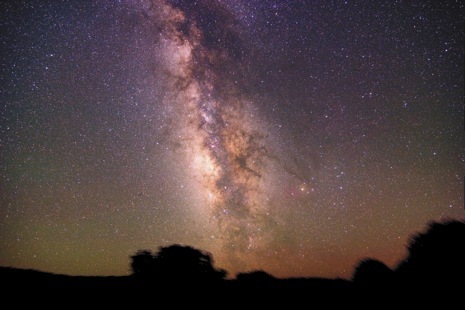« WNYC on emergence | Main | Announcement: NetSci 2008 »
September 09, 2007
Losing the night sky
Last week I read an excellent article by David Owen in The New Yorker about light pollution, and the phenomenon of "sky glow". Living in New Mexico, I'm lucky to have relatively dark night skies compared to places on the coasts where light from the big cities consistently washes out most of the stars in the sky. But, the New Mexican sky (pictured below, in a long exposure; picture taken from the article) is not nearly as dark as the sky I remember in central Belize where it was so dark that you could see both man-made satellites passing overhead (these are easy to spot because of their slow but constant movements), as well as the magnificent Milky Way. To think that most views of the night sky were like that is a bit mind boggling.
The article is well written, describing the general phenomenon of light pollution and its effects, the grass-roots efforts by people to try to cut down on light pollution from cities, the effects of poor outdoor lighting design on local ecologies, human safety and power consumption, etc. What most piqued my interest though was the idea that losing our night skies to light pollution (for instance, light from Las Vegas dims the stars in the sky as far away as the Grand Canyon) has led to a loss of philosophical perspective of our place in the universe. From the introduction to the article:
In Galileo’s time, nighttime skies all over the world would have merited the darkest Bortle ranking, Class 1. Today, the sky above New York City is Class 9, at the other extreme of the scale, and American suburban skies are typically Class 5, 6, or 7. The very darkest places in the continental United States today are almost never darker than Class 2, and are increasingly threatened.  For someone standing on the North Rim of the Grand Canyon on a moonless night, the brightest feature of the sky is not the Milky Way but the glow of Las Vegas, a hundred and seventy-five miles away. To see skies truly comparable to those which Galileo knew, you would have to travel to such places as the Australian outback and the mountains of Peru. And civilization’s assault on the stars has consequences far beyond its impact on astronomers. Excessive, poorly designed outdoor lighting wastes electricity, imperils human health and safety, disturbs natural habitats, and, increasingly, deprives many of us of a direct relationship with the nighttime sky, which throughout human history has been a powerful source of reflection, inspiration, discovery, and plain old jaw-dropping wonder.
For someone standing on the North Rim of the Grand Canyon on a moonless night, the brightest feature of the sky is not the Milky Way but the glow of Las Vegas, a hundred and seventy-five miles away. To see skies truly comparable to those which Galileo knew, you would have to travel to such places as the Australian outback and the mountains of Peru. And civilization’s assault on the stars has consequences far beyond its impact on astronomers. Excessive, poorly designed outdoor lighting wastes electricity, imperils human health and safety, disturbs natural habitats, and, increasingly, deprives many of us of a direct relationship with the nighttime sky, which throughout human history has been a powerful source of reflection, inspiration, discovery, and plain old jaw-dropping wonder.
More information at the International Dark-Sky Association (IDA), including information about lighting fixtures that can both reduce light pollution and save energy, lighting laws and dark-sky activities in parks in preserves.
posted September 9, 2007 01:19 PM in Things to Read | permalink